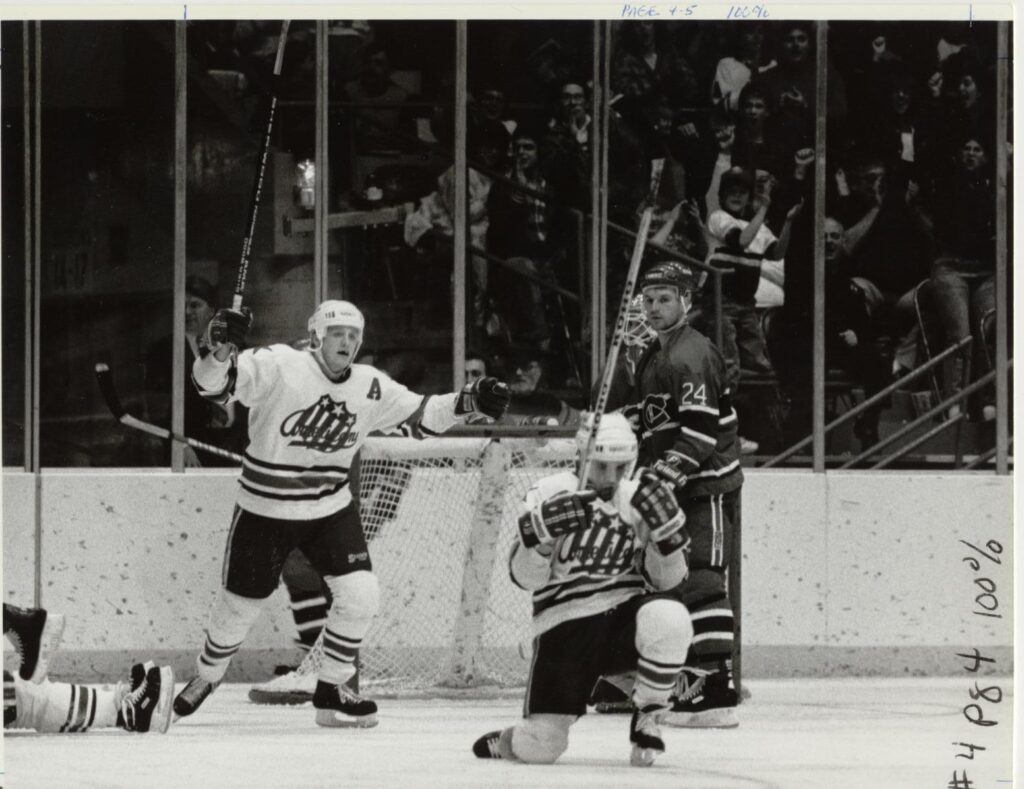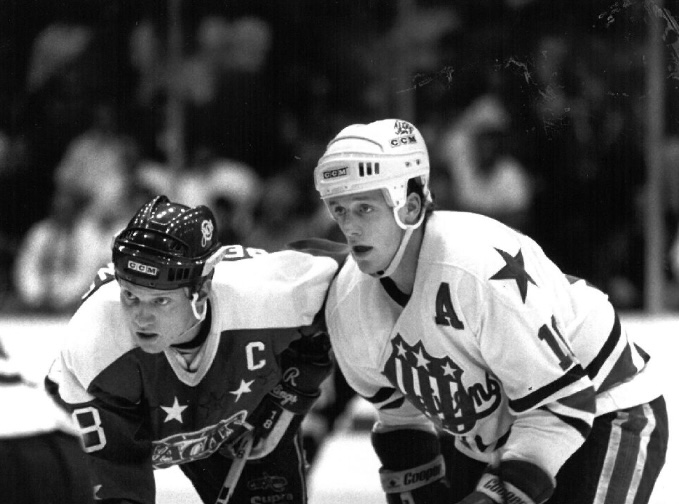By KEVIN OKLOBZIJA
When Scott Metcalfe was playing youth hockey, he never fixated on being the glamour-boy goal-scorer.
Good thing, too. That would have really annoyed his parents, June and Bryan Metcalfe. They weren’t raising some Waltzing Matilda.
“That’s what my mom used to call me if I was just out there skating around, a Waltzing Matilda,” Metcalfe said back in 1996, when he was entering the twilight of his American Hockey League career. “She’d tell the other parents, ‘I’d rather have my son sitting in the penalty box for two minutes than playing like your kids.’ ”
Over the years, as he moved on to major junior and then pro hockey, that stay in the penalty box sometimes lasted five minutes. OK, maybe it often lasted five minutes.
But at least he wasn’t a Waltzing Matilda. Not through junior hockey and not during a 14-year professional career, the glory years of which were spent with the Rochester Americans in the late 1980s and mid-1990s. Whenever he laced up the skates, Metcalfe epitomized toughness, grit and passion.
His rambunctious style and fierce loyalty to the Amerks logo endeared him to fans. In turn, he grew to love the city, and Rochester became his home. He and his wife, Jane, raised three children, sons Tanner and Keegan and daughter Quinn.
But today the Amerks family is in mourning. Metcalfe, a member of the 1996 Calder Cup championship team and a 2006 inductee into the Amerks Hall of Fame, died suddenly on Friday morning surrounded by family at Strong Memorial Hospital. He was 58.
“It’s a terribly sad day for the organization,” Amerks legend Jody Gage said. “Scott had this larger-than-life personality about him, and it resonated with Amerks fans all over Rochester. He wore the red, white and blue proudly every night, was the ultimate competitor and consummate professional who always put his teammates and the organization first.”
That’s precisely how he piled up a franchise-record 1,424 penalty minutes in 499 games.
“He had so much pride about being an Amerk and in Rochester,” said Dane Jackson, the captain of the 1996 Calder Cup team. “As a new guy coming to Rochester in 1995, I always respected how much Metter, Frawls (Dan Frawley) and Gager cared about the program.”
They cared because this was their city, their team, their lives. Metcalfe was born and raised in Metro Toronto but Rochester became his home.
“This was his NHL,” said fellow Amerks Hall of Famer Scott Nichol, Metcalfe’s linemate on the 1996 Cup team. “He was all in. He was totally vested in the community.
“He scored goals, he fought; he was an entertainer. And he taught me as a young guy that it didn’t matter when it was, you bring it. If it’s game 62, you bring it.”
While Metcalfe always played with snarl, he possessed plenty of skill, too. He still ranks seventh in franchise history in points (349) and assists (212) and 11th in goals (137). He wasn’t going to win any foot races, but he did everything in his power to help his team win.
Which is why he was so beloved by fans.
“I didn’t understand why my dad was so upset when Mickey Mantle had passed – I get it now,” long-time fan Eric Bourgeois wrote on Facebook.

Indeed, Metcalfe’s impact extended far beyond statistics and far beyond the rink. Metter loved to laugh and loved to have a good time.
“A Monday night, a Tuesday night, everybody in town knew Metter,” Nichol said. “He was the mayor.”
And he also knew how to read the room. Inside the dressing room, he privately called out teammates when they strayed from the task at hand. He provided encouragement when they needed a boost. And he’d put his neck on the line for the group in closed-door chats with a coach.
“That’s a leader; a leader doesn’t put himself in front of everybody else,” said Rob Ray, his linemate and roommate during the 1988-89 season. “He was the ultimate teammate.”
Four times Metcalfe was voted the Amerks most popular player by the Exec Club. Three times he was awarded the McCulloch Trophy for community service. And in 1996 he was selected to represent the Amerks at the AHL All-Star Classic.
“The Scott Metcalfe mold was definitely used only once,” Amerks broadcaster Don Stevens said in the team’s news release announcing Metcalfe’s passing. “Not sure what I will remember most about Metter: his jokester or serious side; his rugged hockey player side or extremely intelligent, book-reading side; his fun-loving, friendly side or his quite, private side.”
That 1988-89 line with Metcalfe, Ray and Kevin Kerr is still fondly remembered by Amerks fans. And probably not so fondly by defensemen from that era, who were pounded into the end boards time after time.
One of the most memorable Amerk lines ever? “The most entertaining, maybe,” Ray said. “He taught me so much. As a young kid coming in, I didn’t know anything. He’d drag me off the couch to go work out, he’d drag me off the couch to go do something else. We did everything together.”
Even after Ray moved up to the Buffalo Sabres and was embarking on a 15-year NHL career, Metcalfe was in his corner.
“He’d watch games on TV and call me and say, ‘Maybe try this’ or ‘This might work,’ ” I learned more from him than probably anybody.
“He was more into helping everybody else than himself.”
Metcalfe joined the Amerks in February 1988 through a trade between the Sabres and Edmonton Oilers. He was a mainstay for the next three and half seasons, helping Rochester reach the Calder Cup finals in 1990 and 1991.
He played the next two seasons in Germany before rejoining the Amerks in 1993-94, and he was an integral part of that 1996 Cup-winning team, playing on a line with Frawley and Nichol.
“They were by far our best defensive line,” Jackson said. “They’d chip the puck in and they were like howling dogs coming in on the forecheck. They were relentless.”
And opponents didn’t like playing against them.
“Metter was asked to check the other team’s top line, and those type of players, they didn’t want to play against him,” Nichol said. “They didn’t want to go into the corner with Metter or Frawls because they knew they’d come out with a bruised wrist or sore ankle.
“He loved the game and he loved his teammates,” Nichol said. “He was one of a kind.”






















